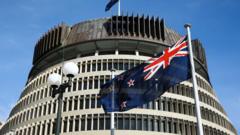In a recent ruling, Speaker Gerry Brownlee firmly defended the ongoing use of the name Aotearoa in parliamentary proceedings, stating he would not entertain further complaints on the matter. This decision comes in light of Deputy Prime Minister Winston Peters' request to restrict the name's use, suggesting that a nationwide referendum should be held concerning the name's adoption. While New Zealand remains the country's legal name—alterable only by legislation—the term Aotearoa, meaning "land of the long white cloud," has a significant place in the Māori language and culture.
Brownlee highlighted its prevalence, noting that Aotearoa appears on New Zealand passports, currency, and in the Māori version of the national anthem. He emphasized, "If other members do not like certain words, they don't have to use them," underscoring the allowance for Members of Parliament (MPs) to communicate in any of the country’s three official languages: English, Māori, and New Zealand sign language.
The recent controversy ignited when Green Party MP Ricardo Menéndez March—who migrated to New Zealand in 2006—used the term in Parliament. Peters, while himself of Māori descent, questioned why a naturalized citizen felt entitled to influence the country's naming conventions without broad public consent. Fellow New Zealand First party member Shane Jones echoed Peters' concerns, probing the appropriateness of recent arrivals dictating cultural nomenclature.
While the Speaker advocated for combining the names by referring to the nation as Aotearoa New Zealand to prevent ambiguity, it remains optional. The attachment some Māori have to the name Aotearoa differs, with its historical context mainly relating to the North Island. Nevertheless, many non-Māori utilize it as a sign of respect toward indigenous cultures.
Despite Brownlee's stance, Peters responded that he would not engage with questions incorporating the term Aotearoa, marking his disagreement with the ruling. The use of Māori has experienced substantial growth in public domains over the last few decades, spurred by the efforts of indigenous advocates. In 2022, the Māori Party initiated a petition to officially rename the country Aotearoa, which garnered over 70,000 signatures.
Māori Party Co-leader Rawiri Waititi underscored the disconnect with the name New Zealand, declaring it a Dutch moniker with no relevance to the land. As the current administration advances, there is a push to prioritize English in government departments, while proposals from the Act party seeking alterations to the Treaty of Waitangi are causing considerable backlash.



















